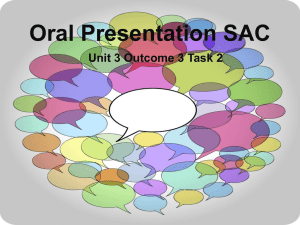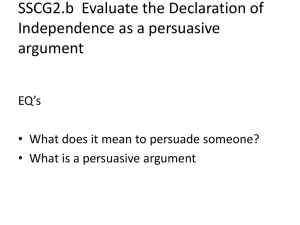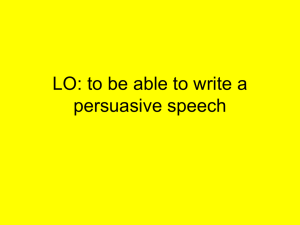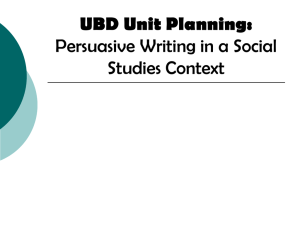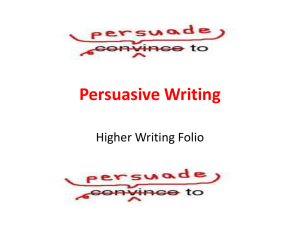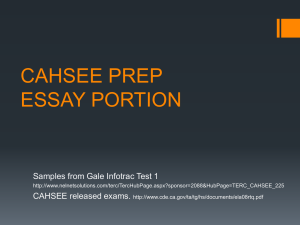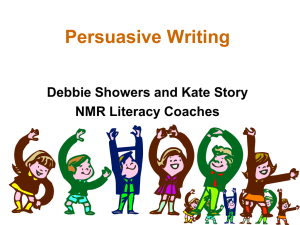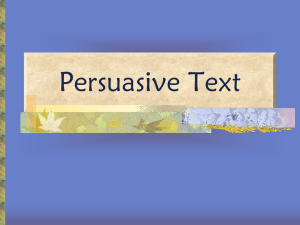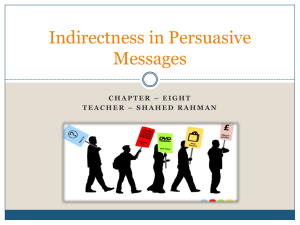Persuasive Writing
advertisement
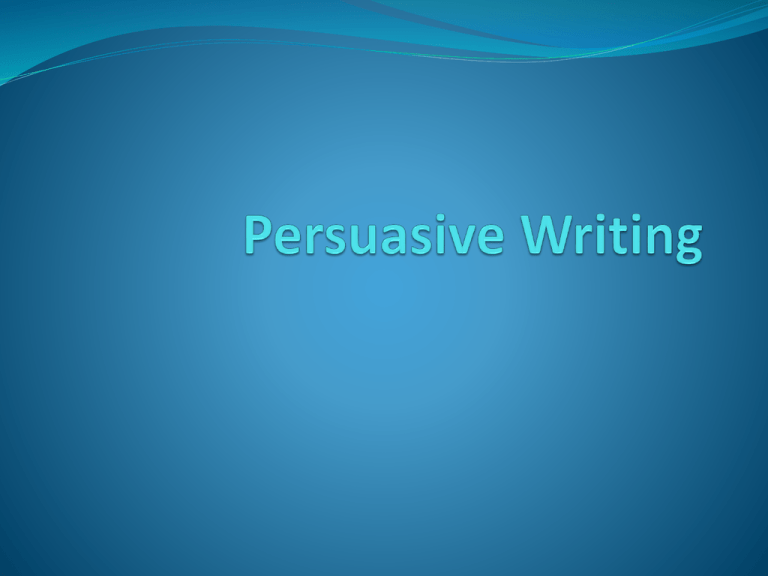
Persuasive Writing The Basic Principles of Persuasive Writing Persuasive writing is writing that sets out to influence or change an audience's thoughts or actions. You are subjected to persuasion everyday from the time you wake up until the time you go to bed. Persuasive Writing Whenever you buy a product or use a service, your choice has likely been influenced by a persuasive marketing ad. There are, of course, many occupations where persuasion is a skill used on an everyday basis. Lawyers, teachers, clergy members, and journalists are just a few. Persuasive Writing The point is that understanding persuasive strategies can help you in two very important ways: 1) Knowing the strategies helps you analyse the strategies other people are using to persuade you. This way you can protect yourself when, for example, unethical marketers are trying to take advantage of you. 2) Knowing the strategies helps you to choose which is the most effective way to persuade an audience. Persuasive Writing How do we get others to accept our point of view? by appealing to their reason by appealing to their emotions by the appeal of our good character Persuasive Writing 1) Appealing to Reason: Remember that an argument is an appeal to a person's sense of reason; it is not a violent fight, dispute, or disagreement. It is a measured, logical way of trying to persuade others to agree with you. One critical thing to remember that there are at least two sides to every issue. If you take the attitude that there is only one side--your side--you will quite likely alienate your reader. You need, then, to choose one side of an issue clearly in an effort to persuade others. If you're unsure of your own stance, how can you expect other people to assess, understand, and be convinced by your position? Persuasive Writing Example: Issue: Should my father stop smoking? Position: Yes Questions you may ask (Your reasoning skills often depend on what we call "common sense"): Ask yourself the following questions: Do I have enough evidence? (Is it sufficient?) Will my audience believe my evidence? (Is it trustworthy?) What are the assumptions built into my argument, and are those assumptions fair? (Is it verifiable?) Does my conclusion follow logically from the claims I make? Persuasive Writing There are two basic types of reasoning processes: Deduction and Induction DEDUCTION: begins with a general principle or premise and draws a specific conclusion from it. ex. All people who smoke endanger their health. (major premise) My father smokes. (minor premise) Therefore, my father is endangering his health. (conclusion) Persuasive Writing Is this a strong argument? you need to offer evidence in support of your claims it may be impossible to prove a cause-effect link between my father's smoking and his declining health Other issues you may bring in to support your argument: 2nd hand smoke / impact on family and friends the staggering number of people over 60 years old who die from lung cancer Persuasive Writing INDUCTION: supports a general conclusion by examining specific facts or cases. Ex. If I was to argue that my father was endangering his health, I might cite specific symptoms: His teeth are yellowish and he's lost a considerable amount of weight. He's no longer able to cycle his 25km every morning. Whenever he exerts himself physically, he ends up coughing extremely hard. Other Logical Appeals? You could cite smoking/cancer statistics, authority in the form of the Surgeon General, financial costs etc... Persuasive Writing 2) Appealing to Emotion: The logical appeal is certainly an extremely persuasive tool. However, our human nature also lets us be influenced by our emotions. One way of evoking emotion in your reader is to use vivid images. Persuasive Writing Ex. (to my father who smokes): "I remember when Grandma died of lung cancer. It was the first time I had ever seen you cry Dad. I remember that you also made me promise not to start smoking." You could also offer vivid examples in support of your argument. Use language and/or images that are emotionally charged: You might detail the pain of going through chemo therapy. You could use Xrays of diseased lungs, or photos of cancerous gums. Persuasive Writing Be careful, however, that when you use emotional appeal, you use it "legitimately." You should not use it as a substitute for logical and/or ethical appeals. Don't use emotional appeals to draw on stereotypes or manipulate our emotional fears. Don't use emotional appeal to get an automatic, knee-jerk reaction from someone. If you use emotionally charged language or examples simply to upset or anger an audience, you are using emotion illegitimately. Your use of emotional appeal shouldn't oversimplify a complicated issue. Persuasive Writing 3) Appealing to our good character: The appeal of your ethics can occur on one or more of the following levels in any given argument: Are you a reasonable person? (That is, are you willing to listen, compromise, concede points?) Are you authoritative? (Are you experienced and/or knowledgeable in the field you are arguing in?) Persuasive Writing Are you an ethical/moral person (Is what you're arguing for ethically sound/morally right) Are you concerned for the well-being of your audience? (To what extent will you benefit as a result of arguing from your particular position?) The ethical appeal is based on the audience's perception of the speaker. Therefore, the audience must trust the speaker in order to accept the arguments. Don't overlook ethical appeal, as it can be the most effective of the three. Persuasive Writing Your Task: Using the elements of persuasive writing as a guide, you are to write a speech. Your aim is to convince your audience (students of the class, me) a specific argument. You are welcome to work with a partner. You can video record your speech if you would like to do so. Persuasive Writing Your speech should be a minimum two minutes and a maximum of four. You must have a minimum 3 arguments. You must have you rough copy approved by the teacher before moving ahead to ensure proper organization of ideas. Your speech must be typed, using TMR or Arial Font, size 12, double-spaced Persuasive Writing Due: Rough: Thursday, October 6th Good Copy: Tuesday, October 11th Persuasive Writing Topics: Uniforms should not be mandatory at JOA The legal drinking age should be reduced to ___ rather than 19 Post-Secondary education in Canada should be free for all students Facebook should have a legal age to use Schools/classes should be segregated by gender so students can be more successful. Exclusive dating in high school should not be permitted. Anti-Smoking laws should be more strictly used. The topic of your choice (to be approved by the teacher).
